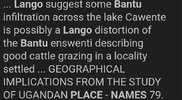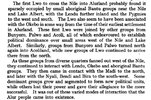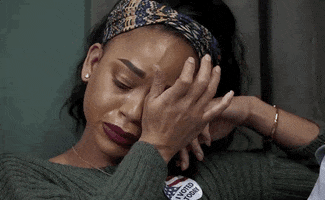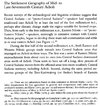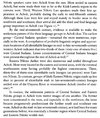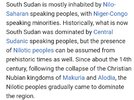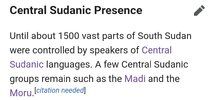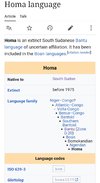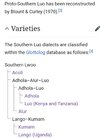Hi @Nilotic , sorry to drag you back into this thread lol. But it seems you're also South Sudanese, so I figured you'd be the perfect person to discuss this with. I was just wondering if you happen to have any knowledge on when the Nilotic groups of South Sudan are believed to have diverged from each other? If such a theory even exists. I was initially just thinking of one large group, with parties of people suddenly splitting off into their own smaller groups, all at once, and subsequently creating the different ethnic groups we see today. But that is actually quite silly now that I think of it. I guess it's more likely that it was instead fragmented and happened over a prolonged period of time.
I.e., Only Group 1 existed initially. A group from then split from that whole, making Group 2. A group then later split off from Group 2, making Group 3. A second group then split off from Group 1, making Group 4, etc.
Also, so I'm Acholi, and according to Wikipedia, my ethnic group got our name from being referred to as Shooli, by the 'Arabic-speaking traders from the north'. If what is meant by that, is that the word derives from Arabic or Arabs in any way, I'm quite doubtful.
I know that 'Chol' is one of the many words/names that seems to exist across various Nilotic groups in South Sudan, if not all. So to think it came from Arabs rather than being native to us is pretty curious. I'm not sure what it means in your language, but for us it means black. So usually we use it quite literally when referring to things that are black/dark, or even for example when referring to someone who's malicious or ill-intended, to say that they have a 'black heart' for example. We also use it to refer to other black people. And then I know we also have the female name, 'Achola'. Although I've only ever met one girl with that name thus far, so it appears it may not be very popular. But if I'm not mistaken, it's given to girls who are born around a time of hardship or tragedy, usually around the death of a family member I believe.
And then, just based off what I know about our naming conventions, I imagine the male equivalent would be 'Ochola'. Anyway, all that rambling to say that it means anything that is quite literally dark/black in colour, or is used to refer to tragedies, malice, anything that is 'dark' in that figurative sense. I'm not sure how much you know of the etymology of that word, in your language, but do you believe it may have indeed come from the Arabs? The only thing I can think is that it potentially came from 'Kohl', which itself is black, so perhaps it was a term used to refer to us by the Arabs in that way? Which now, as I type this, it actually seems pretty plausible that it may've derived from that, lol. What do you think?
I.e., Only Group 1 existed initially. A group from then split from that whole, making Group 2. A group then later split off from Group 2, making Group 3. A second group then split off from Group 1, making Group 4, etc.
Also, so I'm Acholi, and according to Wikipedia, my ethnic group got our name from being referred to as Shooli, by the 'Arabic-speaking traders from the north'. If what is meant by that, is that the word derives from Arabic or Arabs in any way, I'm quite doubtful.
I know that 'Chol' is one of the many words/names that seems to exist across various Nilotic groups in South Sudan, if not all. So to think it came from Arabs rather than being native to us is pretty curious. I'm not sure what it means in your language, but for us it means black. So usually we use it quite literally when referring to things that are black/dark, or even for example when referring to someone who's malicious or ill-intended, to say that they have a 'black heart' for example. We also use it to refer to other black people. And then I know we also have the female name, 'Achola'. Although I've only ever met one girl with that name thus far, so it appears it may not be very popular. But if I'm not mistaken, it's given to girls who are born around a time of hardship or tragedy, usually around the death of a family member I believe.
And then, just based off what I know about our naming conventions, I imagine the male equivalent would be 'Ochola'. Anyway, all that rambling to say that it means anything that is quite literally dark/black in colour, or is used to refer to tragedies, malice, anything that is 'dark' in that figurative sense. I'm not sure how much you know of the etymology of that word, in your language, but do you believe it may have indeed come from the Arabs? The only thing I can think is that it potentially came from 'Kohl', which itself is black, so perhaps it was a term used to refer to us by the Arabs in that way? Which now, as I type this, it actually seems pretty plausible that it may've derived from that, lol. What do you think?

